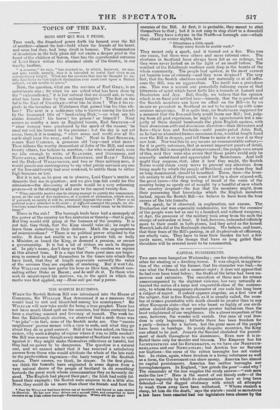TIIE SCOTCH ELECTIONS.
WHEN the Scotch Reform Bill was introduced into the House of Commons, Sir WILLIAM RAE denounced it as a measure that would lead to riot and bloodshed among his countrymen.* Sir 'WILLIAM will now take credit for being a true prophet. There has not been much blood spilt on the occasion, but there certainly has been a startling amount and fervency of tumult. The week be- fore the Edinburgh election, we observed that a mob there was "no joke"—in fact, none of the Scotch mobs are. Our " cannie neighbours" pursue means with a view to ends, and what they go about they do in good earnest.. Still it has been asked, on this oc- casion, why such a display of vigour where it was so little needed ? the Bill Was secure though every member of Scotland were to vote against it : they might make themselves ridiculous or hateful, but they had no power to be dangerous. The question is a natural one, and we cannot admit that it has received a satisfactory answer from those who would attribute the whole of the late riots to the perfervidum ingenium—the hasty temper of the Scottish nation. Their causes, we think, lie deeper. In the first place, we think the tumults have originated in some degree from a very natural desire of the people of Scotland to do something, towards the great work whose consummation they so fervently de- sired. The English had played their part ; the Irish had nobly fol- lowed their example ; the Scotch were anxious to do a little also. Now, they could do no more than cheer the friends and hoot the * Poor Sir WILLIAM had been driven out of Scotland, and forced to take shelter In Harwich. He has now been driven out a second time, and compelled to have recourses° aa Irish rotten borough—Portarlington. Where will he go next 1 enemies of the Bill. At first, it is probable; they meant to Stint themselves to that ; but it is not easy to stop short in a downhill road. They have a rhyme in the North—a borough one—which they chant on winter nights, how
" Oftentimes a little spark
Brings many hands to miekle wark."
They meant only a spark, and it turned out a fire. This was one cause, but there were others and more rational ones. The elections in Scotland have always been felt as an outrage, but they were never looked on in the light of an insult before. The conduct of the Edinburgh worthies sank deep in the hearts of the whole community. The people had spoken, in the most earnest yet humble tone of entreaty—and they were despised ! The very fact, that the Scotch elections could not materially or at all influ- ence the Bill, was an aggravation. The insult was a gratuitous one. This was a second and powerfully inducing cause of that bitterness of spirit which burst forth like a tornado at Lanark and Dunbarton and Ayr. But, thirdly, we believe that the opinion which is so fixed and settled here—namely, that the opposition of the Scotch members can have no effect on the Bill—is by no means so prevalent in Scotland as not to be mixed up with some anxious misgivings. It is quite true, no Scotchinan supposed for a moment that the five-and-forty could harm our Bill ; but, judg- ing from all past experience, he might be apprehensive lest a ma- jority of them should bamboozle the plain English squires, with their donzinium utile and domi ni um di rectum —their liferenters and fiars—their feus and freeholds—until puzzle-pated John Bull, as he had on a hundred former occasions done, would at length hand over the Bill in despair, and tell them to make it or mar it as they saw best. Nor was this by any means an unaccountable notion ;— for it is pretty notorious, that in several important points of detail, the Scotch Bill is susceptible of improvement; the people were aware of this, and they were also aware that those points could only be correctly understood and appreciated by Scotchmen. And well might they suppose, that, alter it how they might, the Scotch Tories would strain every nerve to prevent any alteration from being made by which the people of Scotland, over whom they had so long domineered, should be benefited. These, then—the fever- ish anxiety to aid, if they could, were it but by a show of good-will, the great cause—the deep feeling of insult at the voice of the country being so openly set at nought by a handful of men which the country despised—the fear that the members might, from their possessing that knowledge which the English members lacked, injure the Scotch Bill—we believe to have been the true causes of the late tumults.
We speak, be' it observed, in explanation, not excuse. The: Dunbarton riot was especially indefensible, tar there the enemies' of the people were but as one to a hundred, and without weapons ; at Ayr, the presence of the military took away from the mob the charge of cowardice at least. It had, however, redounded infinitely more to their credit in both places, had they acted as the honest Hawick lads did at the Roxburgh election. We believe, and know, that their fears of the Bill's passing, in all its plenitude of efficiency, are wholly vain. They have to bear their burden for but a few yards more, when the thongs that have so long galled their shoulders will be severed never to be reconnected.


























 Previous page
Previous page